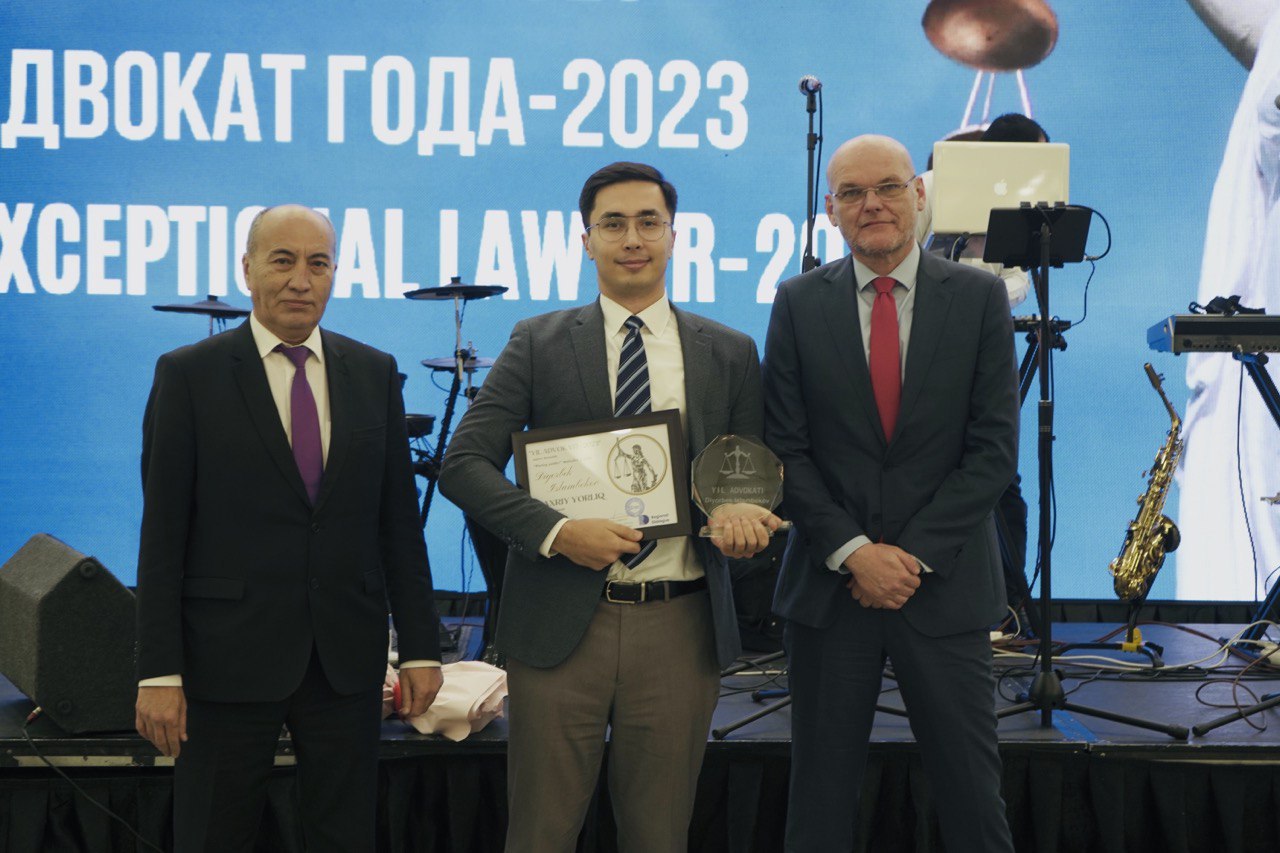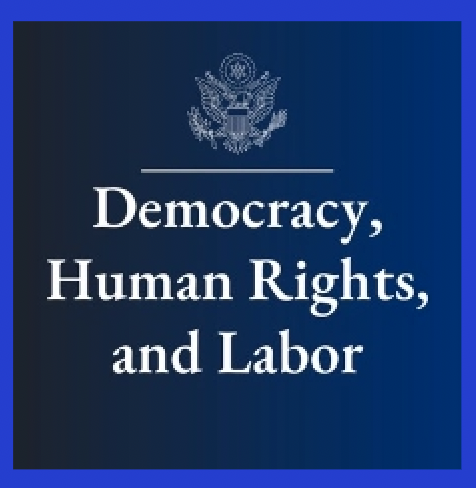
Diyorbek Islambekov graduated from TSUL and gained international experience through studies both in United Kingdom and the United States. Since 2021, Islambekov has been actively practicing law, which notably includes providing legal services during the successful implementation of the public-private partnership project aimed at constructing dialysis clinics in Uzbekistan. The completion of this project addressed a significant challenge within the healthcare system, marking a milestone as the first in Uzbekistan to be regulated by the law on public-private partnership. Islambekov's involvement underscores the broader societal benefits that legal services can provide.
You became the winner of the “Exceptional Lawyer” competition and received the Rising Star Award. Why do you think you were chosen as the winner?
Winning the Exceptional lawyer - 2023 competition in the Rising Star category was an unexpected but very wonderful moment for me. I believe that the jury appreciated not only my personal work, but also the contribution of our entire team to the country's prosperity.
Perhaps I was chosen as a winner because of my desire to contribute to society, focusing on infrastructure projects that not only improve the lives of citizens but also contribute to the national sustainable development goals.
This victory is a testament not only to my efforts, but also to the collective effort of my team to bring positive changes in the practice of law and in society. This will be a source of motivation to further develop the legal profession and strive for higher standards.
Why did you decide to become a lawyer? What motivates you?
I stumbled into the legal field by chance in 2016 while I was still in university. An acquaintance of my friend, who happened to be a defense lawyer, was looking for an assistant. My friend recommended me for the job and that's how I got into the field. I started working as a lawyer and with time realized that this was the field I should be working in. I enjoyed participating in various interesting projects and helping clients. I realized that being an advocate was not just a incidental job for me, but a vocation that I needed to pursue.
What motivates me the most are the challenges I face in my work. Together with my colleagues, we participated in projects in various fields: healthcare, energy, construction, etc. I enjoy thoroughly studying a particular area, looking at every detail in order to provide quality legal assistance.
I love the fact that I am confronted with issues that require not only in-depth analysis, but also creative thinking in addition to traditional approaches. Solving such problems not only greatly enhances my professional qualifications, but also gives me valuable experience that cannot be measured by the number of years I have worked in the profession.
These challenges make my work exciting, and the results of my work motivate me to strive for continuous growth and improvement. These factors make my professional development interesting and inspiring.
What are you most proud of? What do you consider to be the most important thing you do as part of your law practice?
It is difficult to single out the accomplishment of which I am most proud, because in the practice of law each case brings its own emotions and feelings. However, in terms of something that fills me with pride, it is the opportunity to influence the development of young lawyers.
I consider it a great success and honor to work with young professionals, share my experience with them and help them grow professionally. Working with them not only gives me an opportunity to pass on my knowledge, but also creates a favorable environment for exchanging ideas and new approaches to solving legal problems. I believe that the saying "good old times" is outdated and incorrect. With each passing generation, young people are becoming smarter and more progressive than the previous generation. And there is much to be learned from young people.
I also consider my contribution to the field to be a great one, influencing the successful implementation of projects aimed to make our lives more prosperous. All of these thoughts together form the foundation of my professional career, highlighting not only my individual efforts, but also my overall contribution to the legal profession and the training of the next generation of lawyers.
How do you assess the development and state of the legal profession over the past few years?
In recent years, there has been a positive trend in the reform of this institution in Uzbekistan. Important steps have been taken to ensure equality of arms and access to legal services. The introduction of modern technologies and digitalization of processes also serve to better organize the interaction of lawyers with clients and law enforcement agencies.
However, despite the positive developments, some aspects of the reforms require special attention, for example the non-profit nature of the legal profession.
If lawyers are prohibited from engaging in other remunerated activities, this creates additional restrictions and affects their economic freedom. It appears that there is an understanding that the non-profit nature of legal practice in Uzbekistan provides greater independence and impartiality. This is important to ensure that lawyers are free to defend their clients without external pressure from financial interests.
However, this approach is somewhat inappropriate in our current reality. First, a ban on other paid activities may cause financial hardship for lawyers, especially early in their careers. Allowing lawyers to engage in outside activities provides economic stability and helps lawyers develop their own practices. In addition, allowing lawyers to engage in other activities may increase their competitiveness by allowing them to offer a wide range of services to meet the needs of their clients.
In your opinion, what are the main challenges that defense lawyers are facing today and what are the ways to resolve them?
Notwithstanding the reforms carried out in advocacy, I believe that the main issue is to ensure real independence of the legal profession in Uzbekistan by implementing the principle of self-governance.
Here it would be advisable to consider the experience of other countries with a stable legal environment. For example, the reform of the Bar in Uzbekistan, taking into account similar principles of self-governance used in the United States (the model of the Bar Association), could have many advantages for the development of the legal system and more effective provision of lawyers' activities. The system of self-governance of lawyers in the US is based on the concept that lawyers have the right to participate in the governance processes of their profession and to actively participate in the formation of the norms and standards of their profession.
The first important aspect to consider in reforming the legal profession is the establishment of an independent body to govern the profession. This body should consist only of representatives elected by their fellow lawyers and should be empowered to make important decisions on matters of professional ethics, education and professional development.
The second aspect relates to strengthening the role of lawyers in the legislative and policy-making processes. Establishing mechanisms for the active participation of lawyers in the drafting of legislation will help to incorporate their professional experience and perspectives, which may ultimately lead to more balanced laws and regulations.
The introduction of self-governance can also facilitate the establishment of effective self-regulatory and professional accountability mechanisms. These mechanisms may include procedures of the review of complaints, monitoring of ethical conduct, and ensuring the adherence to high standards.
In conclusion, reforming the legal sector in Uzbekistan using the same principles of self-governance as in the United States can lead to a more modern, effective, and accountable profession that will help strengthen the rule of law.
What's the most difficult part of your job?
The most challenging part of my job is ensuring that the interests of all parties involved in the project are aligned while managing the various legal and financial aspects. One example of a common difficulty is sudden changes in legislation.
Let's say we are working on a public-private partnership project. During the course of the project, the government suddenly changes the tax laws related to the investment in the project. These changes may affect the financial parameters of the project, increasing costs or reducing the investor's income.
Overcoming such legal complexities requires not only a thorough understanding of the changes in legislation, but also the ability to quickly adapt to new conditions. It is necessary to revise all legal documents of the project, including contracts with investors, banks and government agencies, to take into account the new laws and minimize negative financial consequences for all parties.
How do you think your work impacts society?
I believe that my work will have a great impact on society by participating in the implementation of projects that will significantly improve the quality of life, promote economic development and contribute to the improvement of public infrastructure.
For example, through public-private partnerships, we can attract private investment for major infrastructure projects. These projects not only create new jobs, but also make efficient use of resources, improve transportation, and contribute to the development of the city.
I am also working to ensure high standards of transparency, accountability and respect for the rights of private investors. This will help create a favorable investment climate, which in turn can lead to an influx of new investment and stimulate economic growth.
Thus, by participating in public-private partnership projects, I can influence the creation of favorable conditions for the formation of sustainable economic prosperity, improvement of living standards of the population and development of urban infrastructure.
What advice could you give to our readers – law students interested in becoming a lawyer?
My advice to law students considering a career in law is to remember that successful practice requires not only a thorough knowledge of the law, but also the ability to analyze, communicate, and solve complex problems. Because the field of law is constantly evolving, it is important to continually update your skills and knowledge.
The legal profession involves working in a business environment, as well as the ability to clearly understand the client's objectives and to provide legal advice that is understandable not only to the professional but also to the client. It is important to be able to present complex legal concepts in simple, understandable language.
Finally, but most importantly, honesty in the practice of law. Honesty, reliability and confidentiality are key aspects of the clients’ trust.
And, of course, don't be afraid to set ambitious goals. Striving for professional growth and excellence is an important factor in becoming a successful lawyer.





